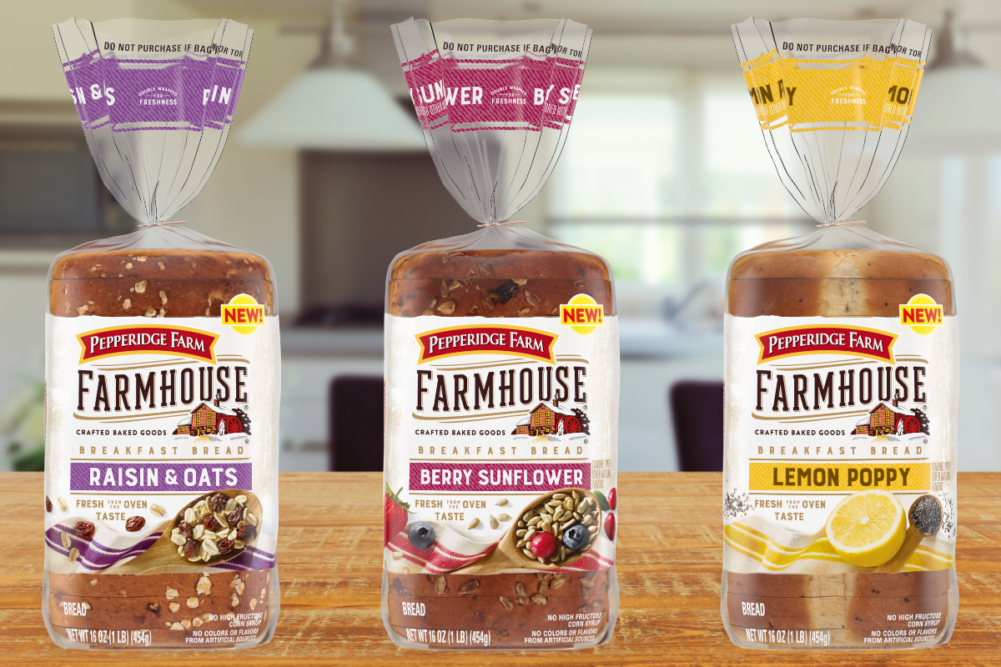CAMDEN, NJ. — The coronavirus (COVID-19) pandemic has not slowed innovation efforts at Campbell Soup Co. In comments made in connection with the release of fourth-quarter and full-year financial results, Mark A. Clouse, president and chief executive officer, said the company launched all planned innovation for 2020 and is on track to deliver fiscal 2021 innovation with no delays.
During the fourth quarter, Campbell introduced Farmhouse Breakfast Bread, which Mr. Clouse described as “soft thick cut slices of bread, rich with whole grains and fruits.”
The new bread is available in three varieties: Raisin and Oats, Berry Sunflower, and Lemon Poppy. The Raisin and Oats variety is made with raisins and oats, while the Berry Sunflower variety features cranberries and sunflower seeds. The Lemon Poppy flavor contains natural lemon flavoring and poppy seed baked right in.
Mr. Clouse said Farmhouse Breakfast Bread was developed before COVID-19 but has been scaled up in recent months. He described the bread as ideal for stay-at-home or on-the-go breakfast consumption. Farmhouse Breakfast Bread is available at retailers nationwide at a suggested retail price of $3.99 for a 16-oz loaf.
The Farmhouse Breakfast Bread line joins Campbell Soup’s Pepperidge Swirl line, which the company also markets as breakfast bread. Pepperidge Swirl bread also is available in three varieties: cinnamon, raisin cinnamon and brown sugar cinnamon.
Beyond the bread aisle, Campbell Soup significantly increased its marketing investment in snacks in the fourth quarter, Mr. Clouse said.
“Our investment reflects a combination of live TV, online and streaming video, along with key media sponsorships,” he said. “I’m also very proud of our snacks team for continuing to drive innovation, which is so critical in the snacking category.”
New product launches include Snyder’s of Hanover Pretzel Rounds and Twisted Sticks as well as Late July organic potato chips.
“These products are demonstrating positive signs on repeat and steady velocity growth,” Mr. Clouse said.
The new products contributed to stronger income and sales within Campbell’s Snacks division in the full year ended Aug. 2. Operating income in the Snacks division totaled $551 million in the year ended Aug. 2, up 6% from fiscal 2019. Meanwhile, net sales in the division increased 5% to $4.05 billion.
Fourth-quarter performance also was strong, Mr. Clouse said. Net sales increased 11% during the quarter while operating profit held flat, which reflected higher sales offset by COVID-19 costs and sustained increases in marketing investment.
“We see this margin dynamic as short-term in nature as we navigate higher COVID-related costs,” Mr. Clouse said. “As the year progresses, we expect to remain on our planned path of margin expansion into fiscal 2021, consistent with the trends that we saw in full year margin expansion in fiscal 2020.”
Mr. Clouse said Campbell Soup experienced some limited share challenges in snacks, due primarily to supply constraints.
“On the Snacks business, our net sales number lagged consumption, primarily due to lower growth in our non-measured channels, specifically in convenience store and vending, as well as some retail inventory reduction,” he said. “We have already taken action. For example … on Goldfish, we have added nearly 20% more capacity to our supply as we head into back-to-school. We also have additional supply coming online for our Cape Cod and Kettle brands in the first half of fiscal 2021.”
Elaborating on some of the supply chain issues during a follow-up call with securities analysts on Sept. 3, Mr. Clouse said Campbell Soup’s Kettle and Cape Cod potato chip businesses have faced the most pressure, with the Lance sandwich cracker business also feeling some pressure.
He said the company is in “great shape” in terms of supply for Goldfish, and recently opened a new production line for the brand’s products at its Willard, Ohio, plant.
“A little bit of what we’re navigating on Goldfish is trying to figure out again that mix as we go through back-to-school on whether it’s bulk or individual packs,” he said. “And we continue to see demand remaining very, very high on the bulk side. But I think, generally speaking, we feel good about that.”
Overall, net income at Campbell Soup in the year ended Aug. 2 totaled $1.63 billion, equal to $5.39 per share on the common stock, up sharply from $211 million, or 70¢ per share, in fiscal 2019. Net sales increased 7.2% to $8.69 billion from $8.11 billion a year ago.





